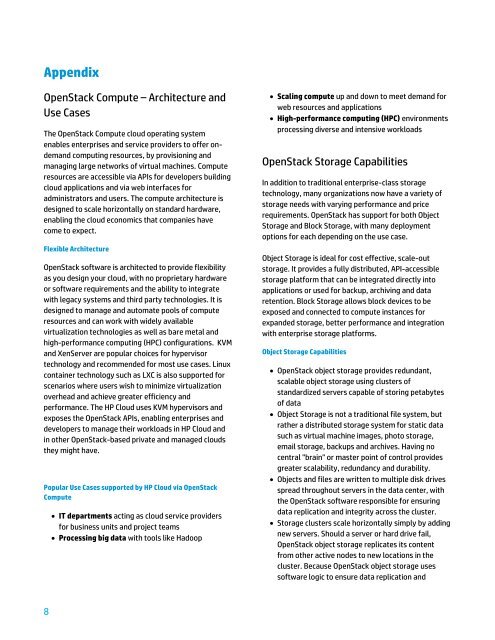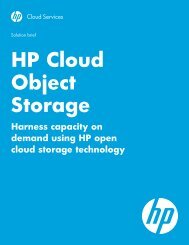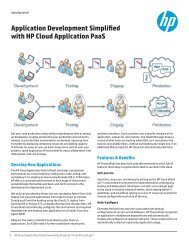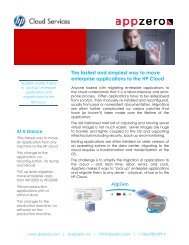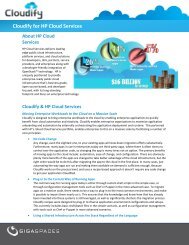HP and the Open Cloud - HP Cloud
HP and the Open Cloud - HP Cloud
HP and the Open Cloud - HP Cloud
You also want an ePaper? Increase the reach of your titles
YUMPU automatically turns print PDFs into web optimized ePapers that Google loves.
Appendix<br />
<strong>Open</strong>Stack Compute – Architecture <strong>and</strong><br />
Use Cases<br />
The <strong>Open</strong>Stack Compute cloud operating system<br />
enables enterprises <strong>and</strong> service providers to offer ondem<strong>and</strong><br />
computing resources, by provisioning <strong>and</strong><br />
managing large networks of virtual machines. Compute<br />
resources are accessible via APIs for developers building<br />
cloud applications <strong>and</strong> via web interfaces for<br />
administrators <strong>and</strong> users. The compute architecture is<br />
designed to scale horizontally on st<strong>and</strong>ard hardware,<br />
enabling <strong>the</strong> cloud economics that companies have<br />
come to expect.<br />
Flexible Architecture<br />
<strong>Open</strong>Stack software is architected to provide flexibility<br />
as you design your cloud, with no proprietary hardware<br />
or software requirements <strong>and</strong> <strong>the</strong> ability to integrate<br />
with legacy systems <strong>and</strong> third party technologies. It is<br />
designed to manage <strong>and</strong> automate pools of compute<br />
resources <strong>and</strong> can work with widely available<br />
virtualization technologies as well as bare metal <strong>and</strong><br />
high-performance computing (<strong>HP</strong>C) configurations. KVM<br />
<strong>and</strong> XenServer are popular choices for hypervisor<br />
technology <strong>and</strong> recommended for most use cases. Linux<br />
container technology such as LXC is also supported for<br />
scenarios where users wish to minimize virtualization<br />
overhead <strong>and</strong> achieve greater efficiency <strong>and</strong><br />
performance. The <strong>HP</strong> <strong>Cloud</strong> uses KVM hypervisors <strong>and</strong><br />
exposes <strong>the</strong> <strong>Open</strong>Stack APIs, enabling enterprises <strong>and</strong><br />
developers to manage <strong>the</strong>ir workloads in <strong>HP</strong> <strong>Cloud</strong> <strong>and</strong><br />
in o<strong>the</strong>r <strong>Open</strong>Stack-based private <strong>and</strong> managed clouds<br />
<strong>the</strong>y might have.<br />
Popular Use Cases supported by <strong>HP</strong> <strong>Cloud</strong> via <strong>Open</strong>Stack<br />
Compute<br />
IT departments acting as cloud service providers<br />
for business units <strong>and</strong> project teams<br />
Processing big data with tools like Hadoop<br />
Scaling compute up <strong>and</strong> down to meet dem<strong>and</strong> for<br />
web resources <strong>and</strong> applications<br />
High-performance computing (<strong>HP</strong>C) environments<br />
processing diverse <strong>and</strong> intensive workloads<br />
<strong>Open</strong>Stack Storage Capabilities<br />
In addition to traditional enterprise-class storage<br />
technology, many organizations now have a variety of<br />
storage needs with varying performance <strong>and</strong> price<br />
requirements. <strong>Open</strong>Stack has support for both Object<br />
Storage <strong>and</strong> Block Storage, with many deployment<br />
options for each depending on <strong>the</strong> use case.<br />
Object Storage is ideal for cost effective, scale-out<br />
storage. It provides a fully distributed, API-accessible<br />
storage platform that can be integrated directly into<br />
applications or used for backup, archiving <strong>and</strong> data<br />
retention. Block Storage allows block devices to be<br />
exposed <strong>and</strong> connected to compute instances for<br />
exp<strong>and</strong>ed storage, better performance <strong>and</strong> integration<br />
with enterprise storage platforms.<br />
Object Storage Capabilities<br />
<strong>Open</strong>Stack object storage provides redundant,<br />
scalable object storage using clusters of<br />
st<strong>and</strong>ardized servers capable of storing petabytes<br />
of data<br />
Object Storage is not a traditional file system, but<br />
ra<strong>the</strong>r a distributed storage system for static data<br />
such as virtual machine images, photo storage,<br />
email storage, backups <strong>and</strong> archives. Having no<br />
central "brain" or master point of control provides<br />
greater scalability, redundancy <strong>and</strong> durability.<br />
Objects <strong>and</strong> files are written to multiple disk drives<br />
spread throughout servers in <strong>the</strong> data center, with<br />
<strong>the</strong> <strong>Open</strong>Stack software responsible for ensuring<br />
data replication <strong>and</strong> integrity across <strong>the</strong> cluster.<br />
Storage clusters scale horizontally simply by adding<br />
new servers. Should a server or hard drive fail,<br />
<strong>Open</strong>Stack object storage replicates its content<br />
from o<strong>the</strong>r active nodes to new locations in <strong>the</strong><br />
cluster. Because <strong>Open</strong>Stack object storage uses<br />
software logic to ensure data replication <strong>and</strong><br />
8


